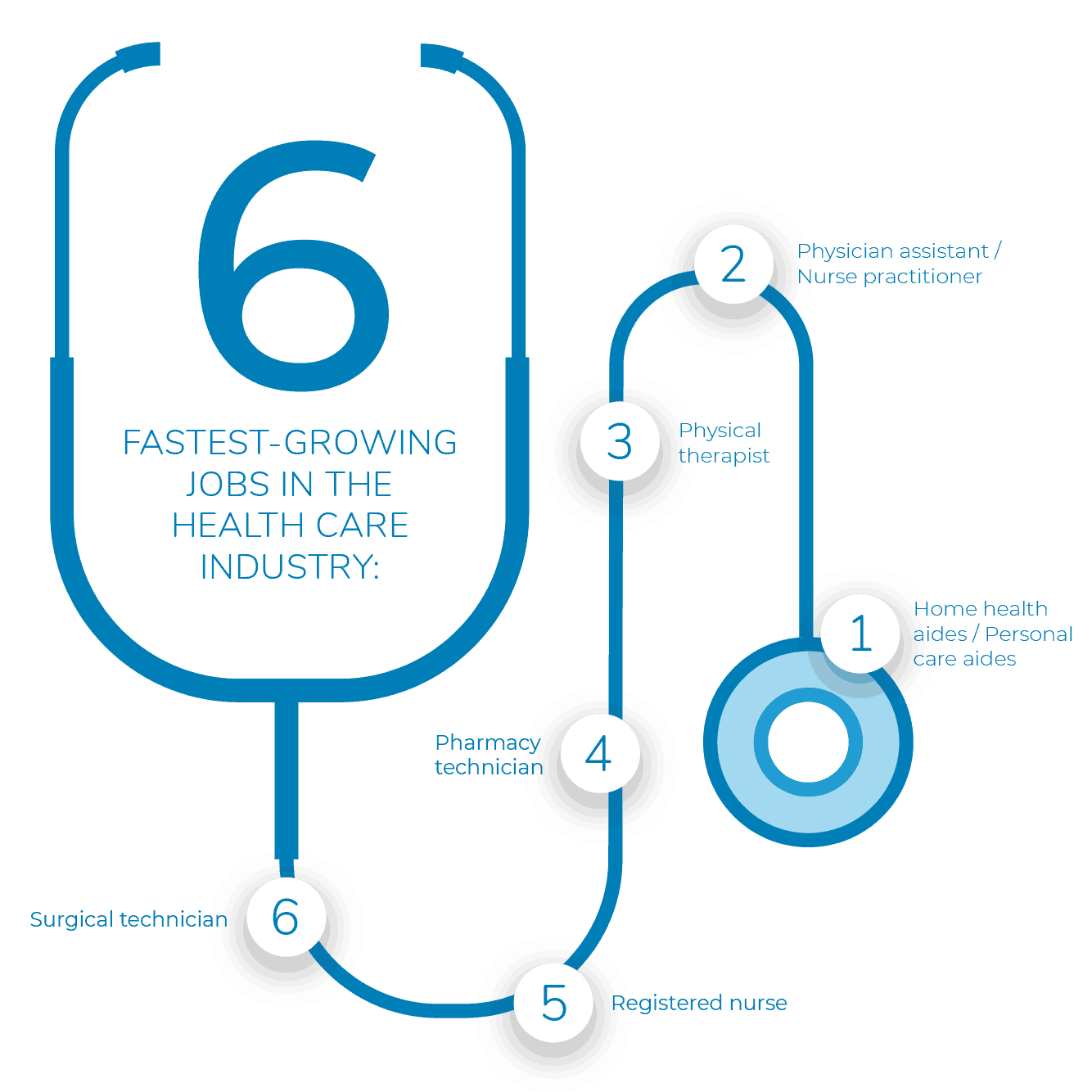The Pulse
Health Care Career Changes: Look Before You Leap
Category: Medical Careers
IN A NUTSHELL:
- Health care industry largest source of jobs
- Trend to continue during next decade
- Health aides, personal care most in demand
The health care industry made history in the last quarter of 2018 as it surpassed both manufacturing and retail to become the largest source of jobs in the United States.
The trend is set to continue with an addition of more than 3.4 million health care and social assistance jobs between 2018 and 2028, according to the Bureau of Labor Statistics (.pdf).
Every two years, the Bureau publishes its occupational and industry projections for the next decade. Out of the 10 jobs projected to see the fastest percentage growth, five are in health care.
Currently, the two fastest-growing occupations in health care are personal care aides and home health aides. The projected growth is mainly due to a large aging population, leading to a greater demand for specialized health care services.

Before anyone makes the jump into a different health care career, there are some important tips to keep in mind.
Eight Tips to Navigate a Health Care Career Transition (Monster.com)
1. Think Ahead
Since the health care industry is volatile, people must be ready for change at all times. It is important to always have a resume ready and be aware of emerging opportunities both inside and outside of the workplace. Experts recommend maintaining a running inventory of transferable skills.
2. Conduct Research
Look into what it would take to become qualified for a desired job. It may involve returning to school or work in a less-than-perfect position on the way to accomplishing a goal.
3. Turn Obstacles Around
A layoff might provoke someone to reexamine career goals for the first time in years. People should not hesitate to ask for help from friends, family, a career coach, an outsourcing firm, or former colleagues while in transition.
4. Consider the Big Picture
Professionals in the health care sector should consider how their working life connects with their personal life before making career decisions. It is important to consider the benefits and disadvantages of a current job, personal strengths and weaknesses, and how the job fits into life. Skipping this element of self-examination could result with ending up in the same type of job or making a bad career decision.
5. Try It Out
Anyone interested in a specific field may want to give it a shot before committing to it full-time. If someone has always worked in a hospital but is considering a career in home care, it may be wise to evaluate the position on a part-time basis before switching careers.

6. Networking
Former colleagues or acquaintances from a professional association can refer someone to job opportunities. Anyone that has been laid off because of structural changes affecting your profession, staying in touch with others who are going through similar ordeals could be a valuable source of support.
7. Keep Your Options Open
Health care professionals should have a career plan but remain flexible when unexpected opportunities arise. For example, nurses have traditionally considered the progression from staff nurse to charge nurse to head nurse to director of nursing as the only option for a career path. That career model doesn’t apply anymore, with such a variety of job descriptions to choose from in the health care sector.
8. Avoid Self-Deprecation
While you are in the midst of a career transition, don’t forget to take care of yourself emotionally. A health professional’s sense of self-worth is often occupied within their jobs, and this impression can be detrimental during stressful periods of a career change.
On the whole, the health care industry is a rapidly growing job sector and has no signs of slowing down. An increasing number of jobs will become available involving home health and personal care as the elderly demographic skyrockets. Nonetheless, it is vital for anyone in the health care industry to evaluate all options and plan ahead before making the jump into a new career.
Intiva Health offers a free career-management platform for health care professionals. Manage credentials, take continuing education courses, and find medical jobs. Create a Free Account today!
Related posts: